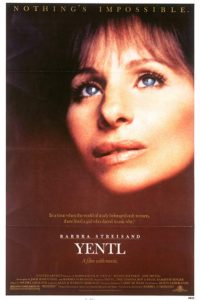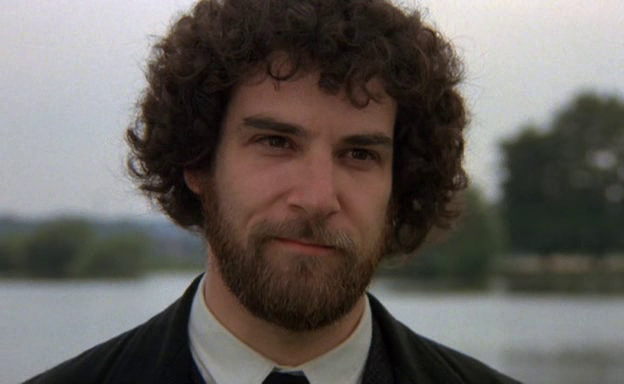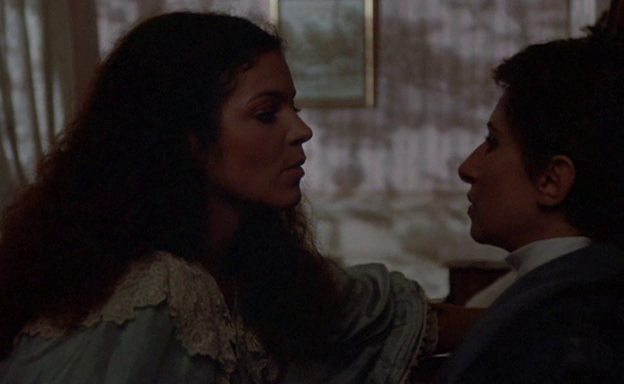|

Synopsis:
In early 20th century Eastern Europe, a young woman named Yentl (Barbra Streisand) — whose father (Nehemiah Persoff) has secretly taught her to read sacred literature — disguises herself as a boy named ‘Anshel’ and leaves her village to study. She soon befriends (and falls in love with) a student named Avigdor (Mandy Patinkin) who is engaged to beautiful young Hadass (Amy Irving) — but when the couple’s ability to marry is threatened, Streisand finds herself in a uniquely challenging position.
|
|
Genres, Themes, Actors, and Directors:
- Amy Irving Films
- Barbra Streisand Films
- Feminism and Women’s Issues
- Gender Bending
- Historical Drama
- Jews
- Love Triangle
- Mistaken or Hidden Identities
- Musicals
Response to Peary’s Review:
Peary writes that despite Hollywood’s snubbing of what they perceived to be Barbra Streisand’s “tremendous ego trip” in adapting Isaac Bashevis Singer’s short story “Yentl the Yeshiva Boy” (which she ultimately had to “direct, produce, and co-write”, given lack of interest or financial support), he finds “the film quite enchanting, humorous, inspiring, and extremely ambitious”. He notes that “Streisand uses her unique character — who has lived as both woman and man — as a positive influence on both Avigdor and Hadass”, given that “it is through Yentl-‘Anshel’ that they become more enlightened in regard to how men and women should perceive and relate to one another”. Peary adds that the “12 Michel Legrand songs” — which are “all utilized as Yentl’s internal monologues” — won’t “appeal to everyone, but Streisand sings them with conviction and they show that this director really wanted to understand her character” (as opposed to “the typical male director” who “might have asked for a less introspective score”). Peary points out that “Streisand handles herself well as director, deftly moving from funny moments to tender scenes between ‘Anshel’ and Hadass to the jolting scene in which Yentl reveals herself to Avigdor (a masterly directed and acted bit)” — and he argues that “one shouldn’t so easily dismiss the fact that this first-time director managed to get excellent performances from her two co-stars as well as the touching, humorous, very warm performance she herself gives”.
I’m in agreement with Peary’s appreciative review of this film, which has held up well and does indeed show tremendous talent from Streisand on numerous fronts. While Streisand chooses not to explore the intriguing potential of gender bending sexual preferences — that is, none of the characters openly reflects on what it means that s/he may be sexually attracted to someone (seemingly) of the same gender — she does effectively highlight how restrictive laws for women once were (and still are for many across the globe). As painful as it is watching Streisand conceal and alter her identity simply to have a chance to study, it’s equally challenging seeing how servile and guileless Irving’s character has been raised to be. By the end of this film, we’re grateful for the disruption ‘Yentl’ has brought to one microcosm of her society, but sad that “once she makes [Avigdor and Hadass] an ideal mate, she must step aside” — and move to America in order to continue her own journey.
Redeeming Qualities and Moments:
- Barbra Streisand as Yentl/Anshel (nominated by Peary as one of the Best Actresses of the Year in his Alternate Oscars)

- Mandy Patinkin as Avigdor

- Amy Irving as Hadass

- Fine direction and cinematography

- Michel Legrand’s score
Must See?
Yes, as a powerful film featuring fine performances.
Categories
- Noteworthy Performance(s)
- Oscar Winner or Nominee
Links:
|
One thought on “Yentl (1983)”
A must for Streisand fans – or those who would appreciate this kind of love story with a non-traditional angle – or those who would have interest in the subject matter.
Personally, I’m not that much of a Streisand fan, though I can’t deny her talent, esp. her unique vocal ability. I’ll second what is said in the assessment re: Streisand’s exploration and handling of gender roles; it’s fertile ground for this kind of story. The subject matter alone can make for compelling viewing.
I’m a little less taken with the ‘internal monologues’ of the score. While they’re perfectly valid for this particular narrative, I feel a certain stagnant musical quality as Michel Legrand’s score progresses from song to song. I realize that it’s a score rooted in themes as opposed to melodies – but I found myself more focused on Alan and Marilyn Bergman’s lyrics. Perhaps Legrand himself thought of his score as being more in support of the central character’s inner growth and intentionally wrote accordingly. Nevertheless, the effect challenges what we’ve come to expect from a musical. Some listeners will take to it more easily than others.
Also – I don’t really buy Streisand as a man, in any way. In her pre-production work, she may have decided that the artistic choice of not making any attempt at Anshel being masculine – or even boyish – in nature would be something that the audience would just quickly learn to accept. I still often found her all-too-feminine characteristics distracting.
All that said, I can see how real fans of the film take to it more than I do. In significant ways, it’s an admirable work.